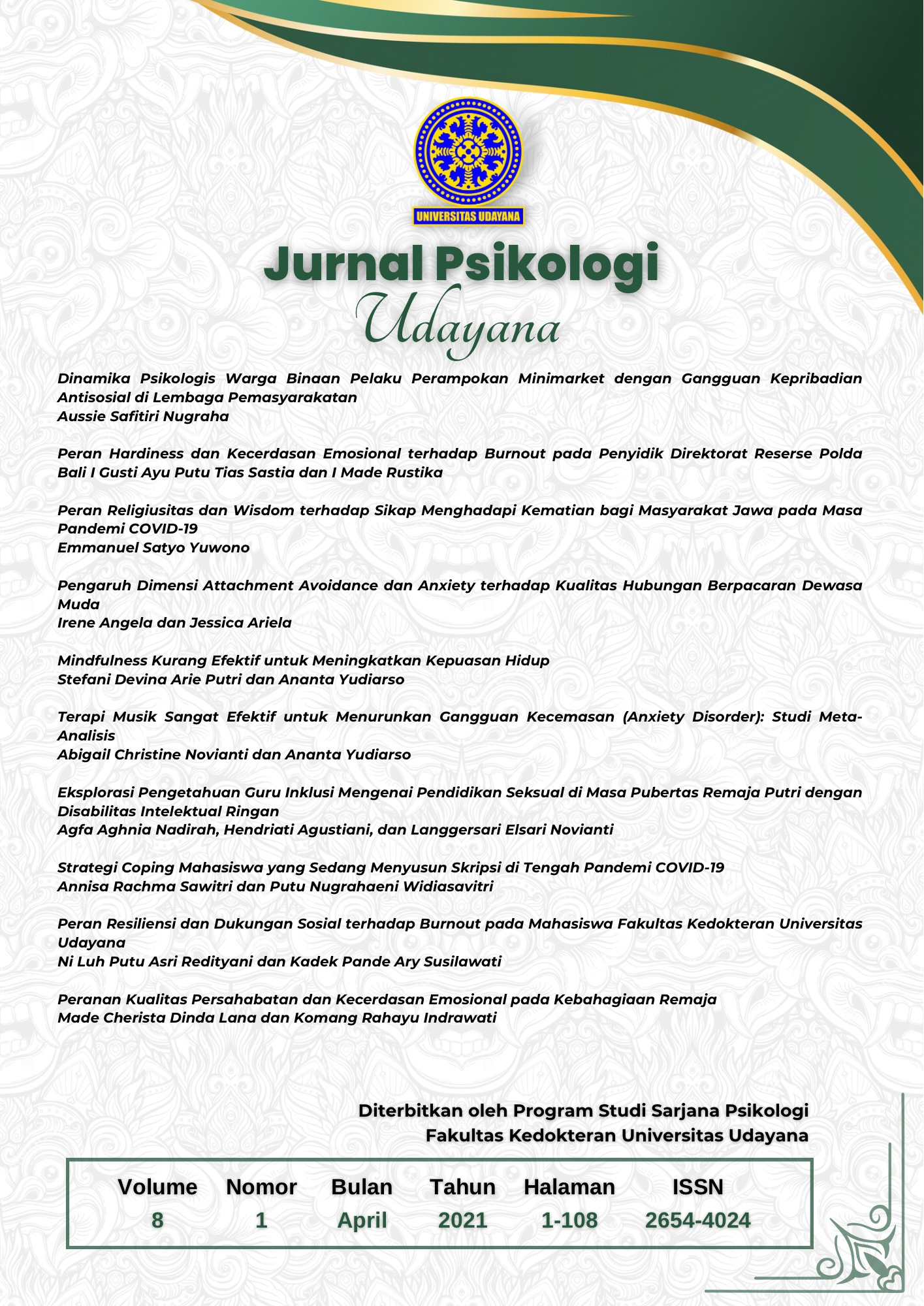Peran religiusitas dan wisdom terhadap sikap menghadapi kematian bagi masyarakat Jawa pada masa pandemi covid-19
Abstract
This study aims to reveal the role of wisdom and religiosity in the attitude of facing death in Javanese society during the Covid-19 pandemic. The research was conducted in Desa Banyubiru, Kab. Semarang, Central Java, with a total of 50 participants. This study applies three measurement scales, namely (1) the self-assessed wisdom scale (SAWS) developed by Webster (2003); (2) The Centrality of Religiosity Scale (CRS) developed by Huber & Huber (2012); and (3) Death Attitude Profile-Revised (DAP-R) developed by Wong, Reker, & Gesser (1994). The measurement scale has been modified into Indonesian language because of the environmental context of the research participants. This research draws upon quantitative approach with multiple regression statistical analysis. The results showed an F value of 5.743 with a level of significance 0.006 (p <0.05), which means religiosity and wisdom has simoultanesly impact towards the death attitude in Javanese society. The amount of contribution given by the two independent variables together is 19.6%. the further researchers require to consider the cultural, environmental, and socioeconomic context in referring attitudes toward death
Downloads
References
Archentari, and Siswati, (2015). Hubungan antara religiusitas dengan kecemasan terhadap kematian pada individu fase dewasa madya di pt tiga serangkai group. Empati, vol. 3, no. 3, pp. 106-116
Ardelt, M. (2008). Wisdom, religiosity, purpose in life, and attitudes toward death. International Journal Psychology & Psychotherapy 2(1),1-4.
Ardelt, M. (2008). Wisdom, religiosity, purpose in life, and death attitudes of aging adults. In (Eds.), Existential and spiritual issues in death attitudes (p. 139–158).
Azwar, S. (2017). Metodologi Penelitian Kuantitatif. Edisi 2. Yogyakarta : Pustaga Pelajar.
Cicirelli, V. G. (2002). Fear of death in older adults: Prediction from terror management theory. Journal of Gerontology, 57(4), 358-366.
Coleman dkk. (2018). Introduction to the Special Issue: What are Religious Beliefs?. contemporary pragmatism. 279-283
Dezutter,J., Soeness,B., Luyckx,K., Bruyneei,S., Vansteenkiste,M., Duriez,B., & Hutsebaut,D. (2008). The role of religion in death attitudes: Distinguishing between religious belief and style of processing religious contents. Death Studies, 33:1, 73-92. http://dx.doi.org/10.1080/07481180802494289
Geertz, C. (1960). Religion of Java. London: Collier McMillan
Hardjana, Agus M. (2005). Religiusitas, Agama, dan Spiritualitas. Yogyakarta: Kanisius.
Jalaluddin. (2004). Psikologi Agama, PT. Grafindo, Jakarta
Kimmel, D. (1990). Adulthood and Aging. New York: John Willy & Sons, Inc.
Okechi, O.S. (2017). Culture, Perception/belief about death and their implication to the awareness and control of the socio-economic, environmental nand health factors surrounding lower life expectancy in Nigeria. Acta Psychopathologica, vol.3 no. 56. DOI : 10.4172/2469-6676.100128
Purwadi, (2007). Filsafat Jawa dan Kearifan Lokal Yogyakarta: Panji Pustaka.
Sugiyono, (2019). Statistika Untuk Penelitian. Bandung : Alfabeta.
Wisnumurti, R. (2012). Sangkan Paraning Dumadi: Konsep Kelahiran dan Kematian Orang Jawa. Yogyakarta: Diva Press.
Wittkowski, J. (1988). Relationship between religiosity and attitudes towards death and dying in a middle-aged sample. Z. person. individ. Diff 9 (2), 307-312.

This work is licensed under a Creative Commons Attribution-ShareAlike 4.0 International License.
Authors who publish with this journal agree to the following terms:
- Authors retain copyright and grant the journal right of first publication with the work simultaneously licensed under a Creative Commons Attribution-ShareAlike 4.0 International License that allows others to share the work with an acknowledgement of the works authorship and initial publication in this journal.
- Authors are able to enter into separate, additional contractual arrangements for the non-exclusive distribution of the journals published version of the work (e.g., post it to an institutional repository or publish it in a book), with an acknowledgement of its initial publication in this journal.
- Authors are permitted and encouraged to post their work online (e.g., in institutional repositories or on their website) prior to and during the submission process, as it can lead to productive exchanges, as well as earlier and greater citation of published work (See The Effect of Open Access).













